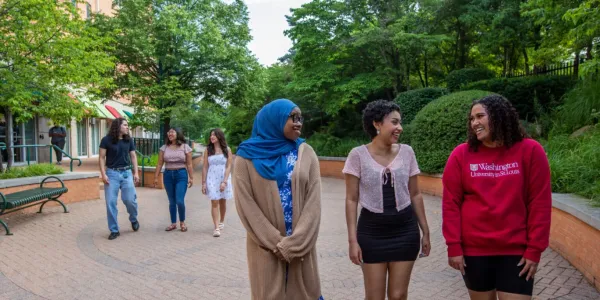The Center for the Humanities’ recent poetry project offered hundreds of participants an opportunity to confront fear and isolation with creative expression.
In March 2020, as daily life in the United States rapidly changed in response to the escalating COVID-19 pandemic, Jean Allman noticed something happening online. As a historian, the director of Washington University’s Center for the Humanities, and the J.H. Hexter Professor in the Humanities, Allman’s professional life is steeped in the humanities. Yet it was at this moment, while physically separated from friends and colleagues, that she saw a dramatic uptick in arts and humanities content shared through both social media and person-to-person networks.
“I was struck by how, in the midst of a medical crisis, much humanities-focused or inflected work was sustaining people in their daily lives, connecting them to others — favorite novels, histories of pandemics, museums and art, poetry, performance, music,” Allman said.

Allman and her son, Brendan Roediger (a 2005 graduate of WashU Law), have been trading word prompts and poems for years. They expanded the idea by inviting a small group to take part in a poetry exercise. The task was simple: write a short poem in response to a list of five words. The participants’ enthusiasm sparked an idea. “It got me thinking that maybe the Center could try to push the poetry idea out in even bigger ways,” Allman said. “Then, when I realized it was National Poetry Month in April, well, I decided it was a sign!”
With the assistance of Kathleen Fields, communications director for the Center for the Humanities, and Aaron Coleman, an award-winning poet and doctoral student in comparative literature, the Life/Lines project launched April 1. Every weekday, the center sent out a list of 5 words and welcomed short poems in response. As the project grew, guest curators including Chancellor Andrew Martin (April 8), St. Louis poet laureate Jane Ellen Ibur (April 10), Dean Barbara Schaal (April 15), Riverfront Times founder Ray Hartmann (April 16), and former associate vice chancellor Steve Givens (April 29) provided the five-word prompts.
The community response to Life/Lines exceeded all expectations. By the end of April, more than 300 participants sent in over 1,000 poems, including a poetic video. Dozens of contributors sent in poems every day, and in one day alone, the center received more than 70 submissions. Participants ranged from first-time poets to full-time creative writers, and about half of the email addresses receiving the daily prompts came from outside Washington University.
Coleman, who brainstormed with Allman at the outset of the project and provided one of the first curated lists of words, believes that the success of Life/Lines resulted in part from its simplicity. “The five words are like a gentle key that helps people open their own imaginations. From the onset I appreciated how it didn’t feel too demanding or constricting,” he said. “The prompts can seem quite unassuming, but that’s a good thing in this case because they’re rife with possibilities – we can take the endless possible ways of using five words and shape the poem into what we need it to be.”
For many participants, the poems offered an opportunity to process the isolation and uncertainty that accompanied the COVID-19 pandemic. This was especially true for Melissa Bancks, a Washington University alumna and former director of the Howard Nemerov Writing Scholars Program.
“My mother tested positive for COVID shortly after I submitted my list for this project. As I watched her struggle ... this project threw me quite a lifeline. It alleviated some of the angst of knowing my mother was seriously ill when I thought of the beautiful, creative energy out in the world.”
“My mother tested positive for COVID shortly after I submitted my list for this project,” Bancks shared. “As I watched her struggle through the forced distance of FaceTime, and while I heard the exhaustion and fear of the medical workers giving everything they had to help my mother and every resident, this project threw me quite a lifeline. It alleviated some of the angst of knowing my mother was seriously ill when I thought of the beautiful, creative energy out in the world.”
“Creating poetry is a private exercise, and yet this project brought individual, isolated artists, and those of us facing the reality of COVID, together in a meaningful way,” said Bancks.
Even for those not directly affected by COVID-19, Life/Lines provided a welcome source of both structure and creativity. In early May, the center gathered anonymous feedback about the project. “My participation in the #Life/Lines poetry prompt project has been a literary lifeline that I shall remember for the rest of my lifetime,” one participant wrote. Numerous respondents encouraged the center to revive the exercise next April.
For Allman, the overwhelming positive response was “heart-warming and affirming,” and also reflected her own experience of the project. “Honestly, the poetry project was a true lifeline for me,” Allman said. “At some point, I decided it had become a counter-contagion. Like COVID-19, the project was spreading through social networks in ways that were not easily discerned. But now I found myself counting project sign-ups and daily poems, rather than cases of COVID-19 and fatalities.”
Poems created through Life/Lines continue to be available online. Allman and Fields are working on ways to develop submissions into a short print publication, as well as a permanent archive and teaching tool. In the meantime, participants and readers from across the country can continue to discover connections to one another through these poetic snapshots from an unprecedented moment in history.
“The sudden loss or postponement of so many plans and hopes (for the spring, for the year) is something that I feel like I’ve had to grieve in stages since mid-March,” said Coleman. “Processing that amount of upheaval and uncertainty can feel confusing and even demoralizing. But being a part of this project was a wonderful, peaceful, constant reminder that none of us are going through these emotions alone.”




